The Effect of Reading on the Human Brain: A Critical Reading
VerifiedAdded on 2023/06/04
|5
|749
|243
AI Summary
This critical reading explores the effect of reading on the human brain, with a focus on cognitive and behavioral attributes. It discusses how reading can influence speech recognition and language development, and how the brain reacts to certain words and metaphors. The article also examines the purpose of the research and the evidence supporting the main idea.
Contribute Materials
Your contribution can guide someone’s learning journey. Share your
documents today.
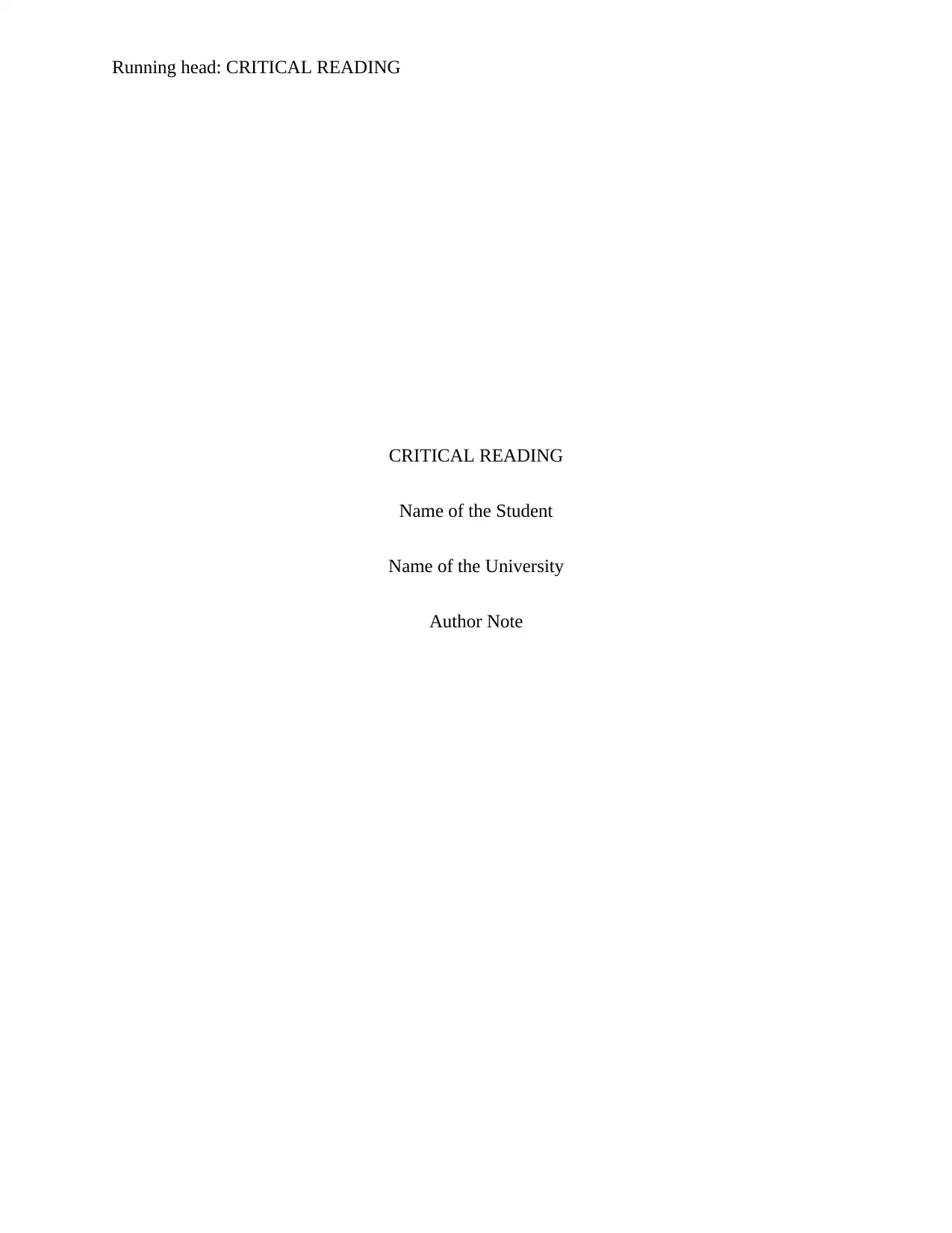
Running head: CRITICAL READING
CRITICAL READING
Name of the Student
Name of the University
Author Note
CRITICAL READING
Name of the Student
Name of the University
Author Note
Secure Best Marks with AI Grader
Need help grading? Try our AI Grader for instant feedback on your assignments.
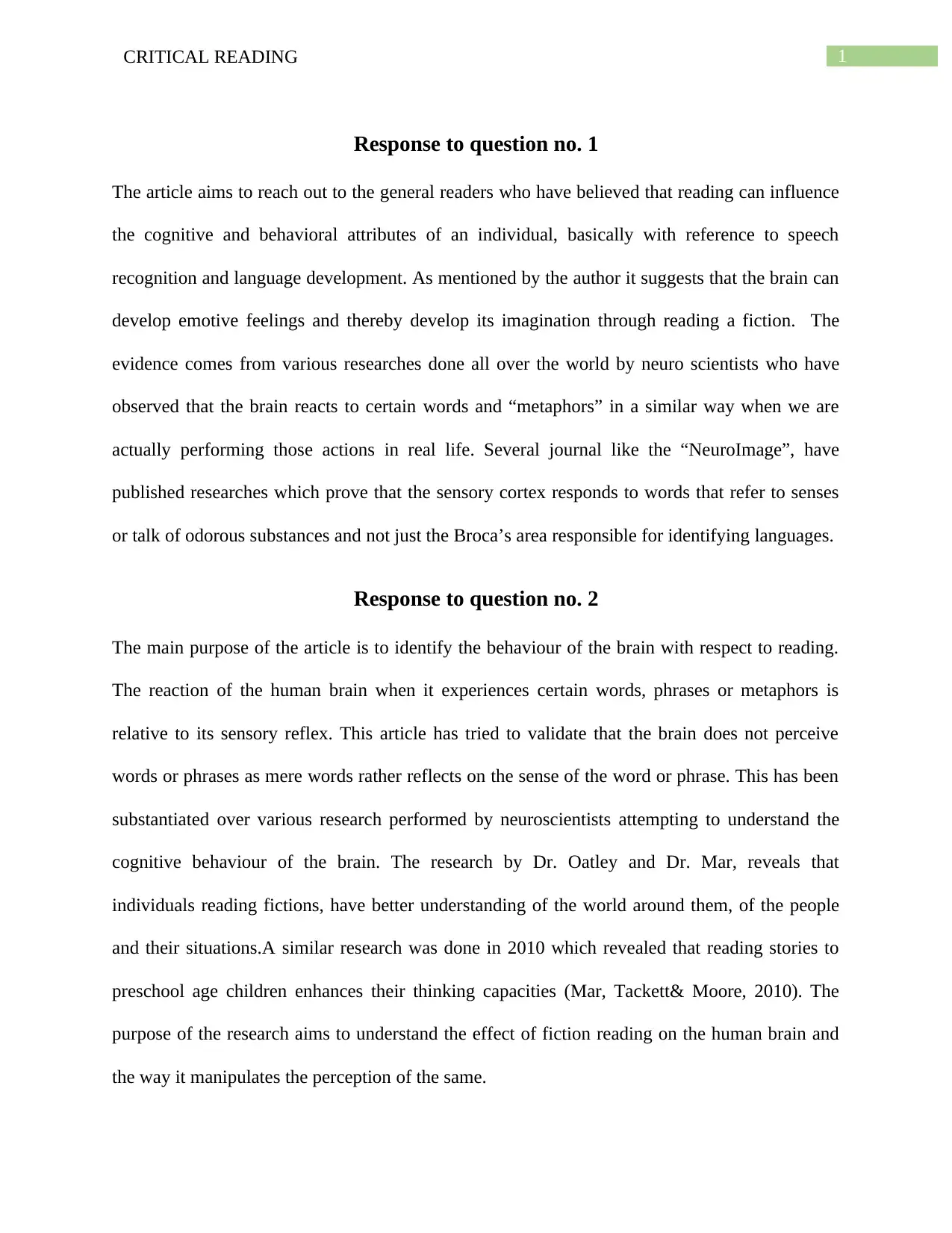
1CRITICAL READING
Response to question no. 1
The article aims to reach out to the general readers who have believed that reading can influence
the cognitive and behavioral attributes of an individual, basically with reference to speech
recognition and language development. As mentioned by the author it suggests that the brain can
develop emotive feelings and thereby develop its imagination through reading a fiction. The
evidence comes from various researches done all over the world by neuro scientists who have
observed that the brain reacts to certain words and “metaphors” in a similar way when we are
actually performing those actions in real life. Several journal like the “NeuroImage”, have
published researches which prove that the sensory cortex responds to words that refer to senses
or talk of odorous substances and not just the Broca’s area responsible for identifying languages.
Response to question no. 2
The main purpose of the article is to identify the behaviour of the brain with respect to reading.
The reaction of the human brain when it experiences certain words, phrases or metaphors is
relative to its sensory reflex. This article has tried to validate that the brain does not perceive
words or phrases as mere words rather reflects on the sense of the word or phrase. This has been
substantiated over various research performed by neuroscientists attempting to understand the
cognitive behaviour of the brain. The research by Dr. Oatley and Dr. Mar, reveals that
individuals reading fictions, have better understanding of the world around them, of the people
and their situations.A similar research was done in 2010 which revealed that reading stories to
preschool age children enhances their thinking capacities (Mar, Tackett& Moore, 2010). The
purpose of the research aims to understand the effect of fiction reading on the human brain and
the way it manipulates the perception of the same.
Response to question no. 1
The article aims to reach out to the general readers who have believed that reading can influence
the cognitive and behavioral attributes of an individual, basically with reference to speech
recognition and language development. As mentioned by the author it suggests that the brain can
develop emotive feelings and thereby develop its imagination through reading a fiction. The
evidence comes from various researches done all over the world by neuro scientists who have
observed that the brain reacts to certain words and “metaphors” in a similar way when we are
actually performing those actions in real life. Several journal like the “NeuroImage”, have
published researches which prove that the sensory cortex responds to words that refer to senses
or talk of odorous substances and not just the Broca’s area responsible for identifying languages.
Response to question no. 2
The main purpose of the article is to identify the behaviour of the brain with respect to reading.
The reaction of the human brain when it experiences certain words, phrases or metaphors is
relative to its sensory reflex. This article has tried to validate that the brain does not perceive
words or phrases as mere words rather reflects on the sense of the word or phrase. This has been
substantiated over various research performed by neuroscientists attempting to understand the
cognitive behaviour of the brain. The research by Dr. Oatley and Dr. Mar, reveals that
individuals reading fictions, have better understanding of the world around them, of the people
and their situations.A similar research was done in 2010 which revealed that reading stories to
preschool age children enhances their thinking capacities (Mar, Tackett& Moore, 2010). The
purpose of the research aims to understand the effect of fiction reading on the human brain and
the way it manipulates the perception of the same.
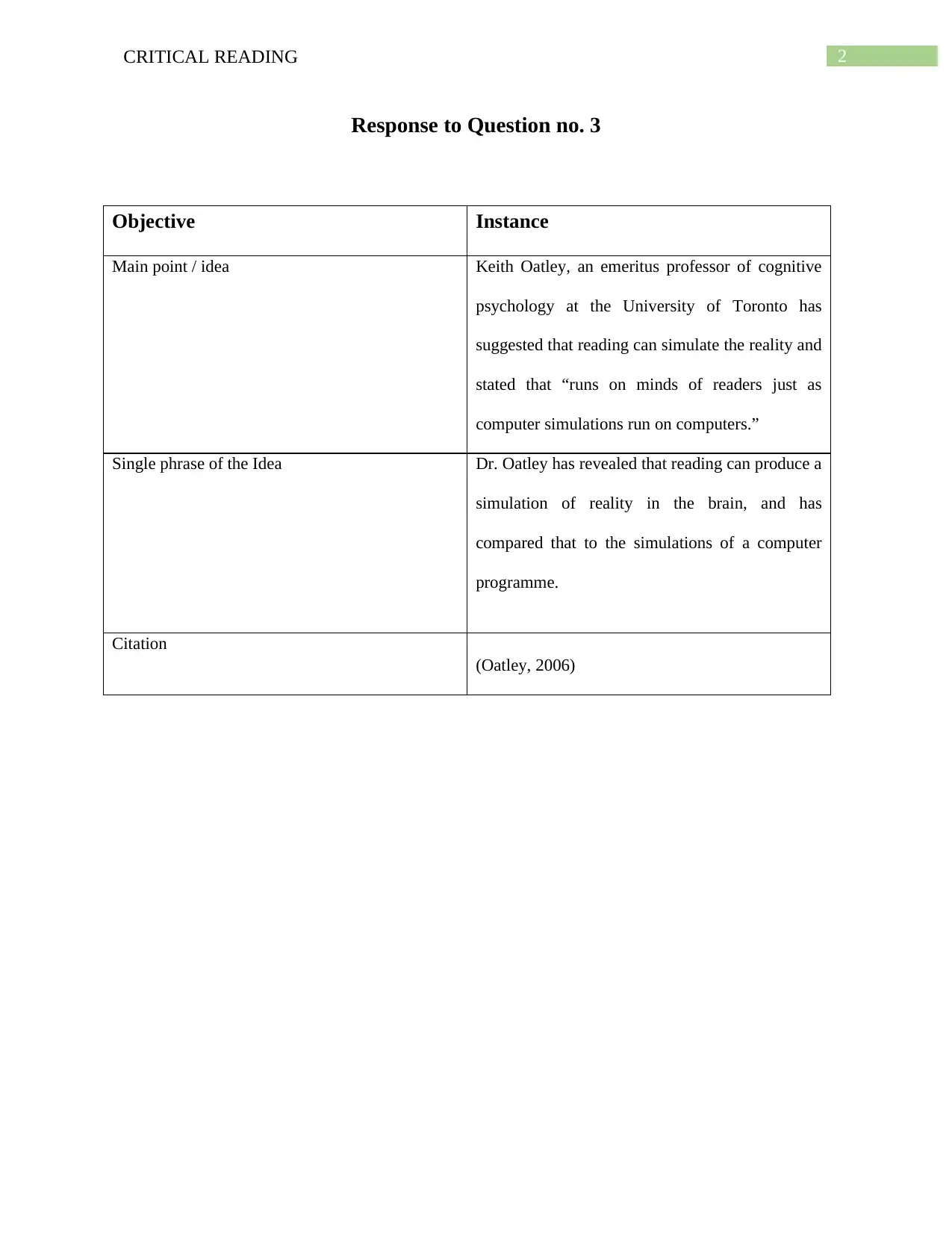
2CRITICAL READING
Response to Question no. 3
Objective Instance
Main point / idea Keith Oatley, an emeritus professor of cognitive
psychology at the University of Toronto has
suggested that reading can simulate the reality and
stated that “runs on minds of readers just as
computer simulations run on computers.”
Single phrase of the Idea Dr. Oatley has revealed that reading can produce a
simulation of reality in the brain, and has
compared that to the simulations of a computer
programme.
Citation
(Oatley, 2006)
Response to Question no. 3
Objective Instance
Main point / idea Keith Oatley, an emeritus professor of cognitive
psychology at the University of Toronto has
suggested that reading can simulate the reality and
stated that “runs on minds of readers just as
computer simulations run on computers.”
Single phrase of the Idea Dr. Oatley has revealed that reading can produce a
simulation of reality in the brain, and has
compared that to the simulations of a computer
programme.
Citation
(Oatley, 2006)
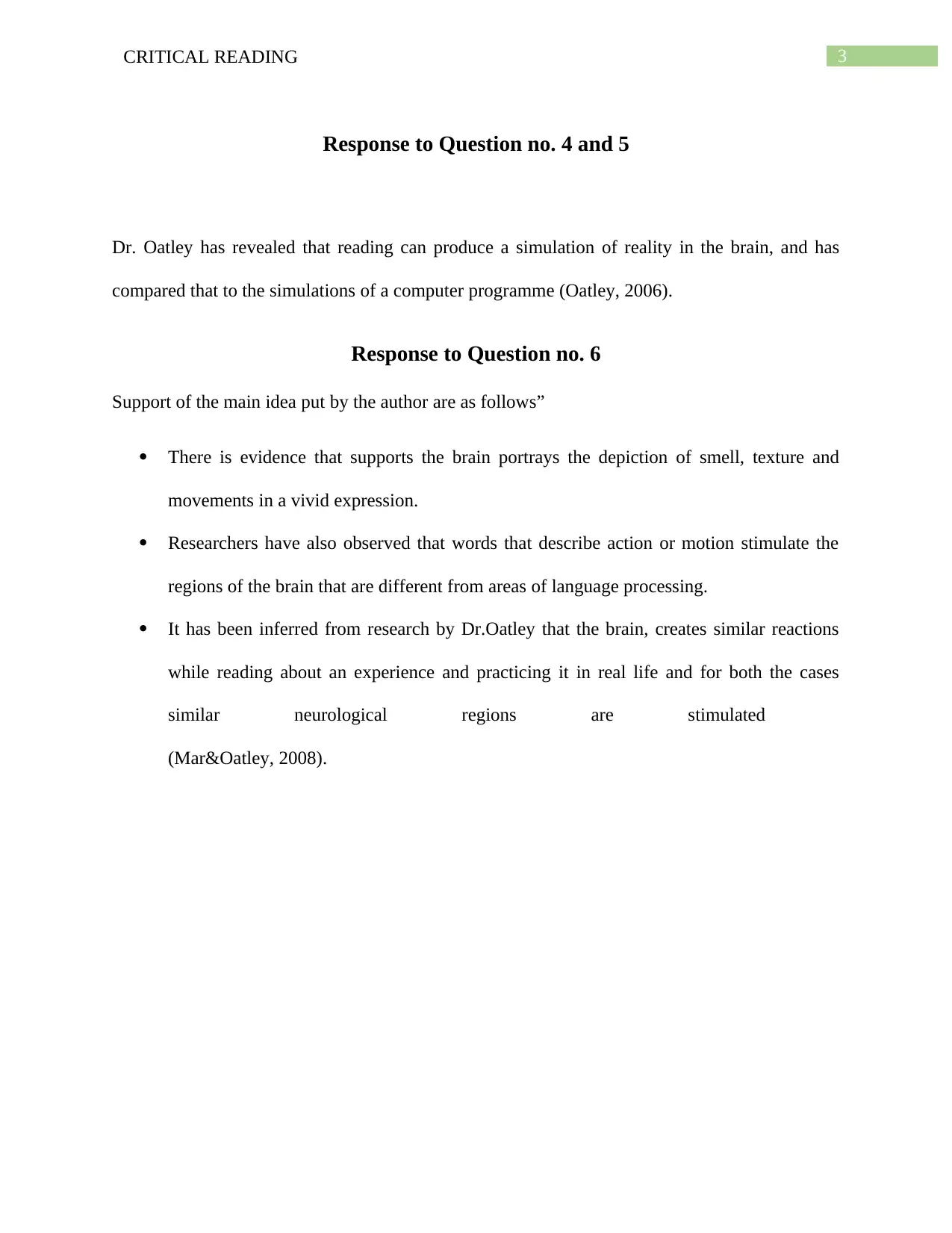
3CRITICAL READING
Response to Question no. 4 and 5
Dr. Oatley has revealed that reading can produce a simulation of reality in the brain, and has
compared that to the simulations of a computer programme (Oatley, 2006).
Response to Question no. 6
Support of the main idea put by the author are as follows”
There is evidence that supports the brain portrays the depiction of smell, texture and
movements in a vivid expression.
Researchers have also observed that words that describe action or motion stimulate the
regions of the brain that are different from areas of language processing.
It has been inferred from research by Dr.Oatley that the brain, creates similar reactions
while reading about an experience and practicing it in real life and for both the cases
similar neurological regions are stimulated
(Mar&Oatley, 2008).
Response to Question no. 4 and 5
Dr. Oatley has revealed that reading can produce a simulation of reality in the brain, and has
compared that to the simulations of a computer programme (Oatley, 2006).
Response to Question no. 6
Support of the main idea put by the author are as follows”
There is evidence that supports the brain portrays the depiction of smell, texture and
movements in a vivid expression.
Researchers have also observed that words that describe action or motion stimulate the
regions of the brain that are different from areas of language processing.
It has been inferred from research by Dr.Oatley that the brain, creates similar reactions
while reading about an experience and practicing it in real life and for both the cases
similar neurological regions are stimulated
(Mar&Oatley, 2008).
Secure Best Marks with AI Grader
Need help grading? Try our AI Grader for instant feedback on your assignments.
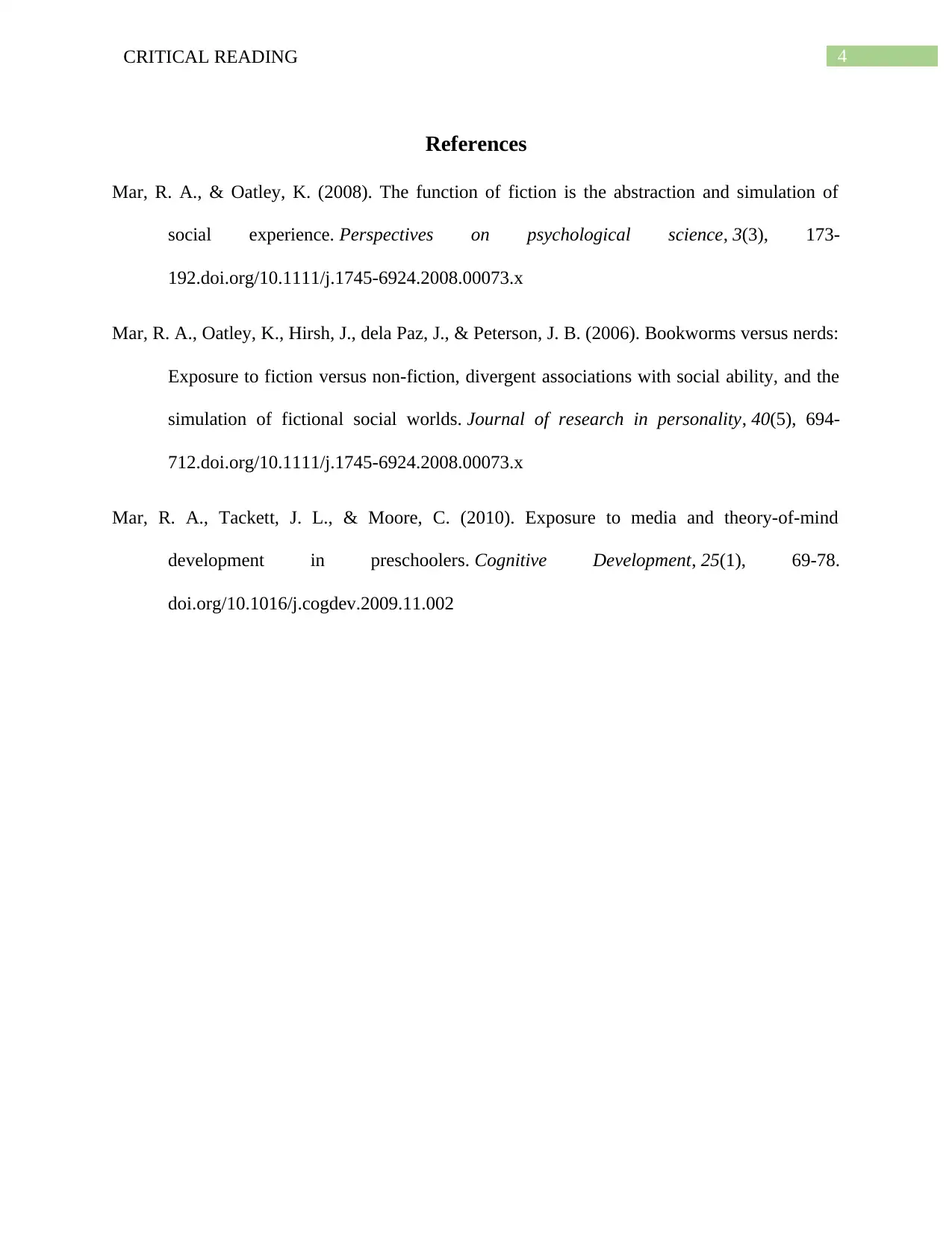
4CRITICAL READING
References
Mar, R. A., & Oatley, K. (2008). The function of fiction is the abstraction and simulation of
social experience. Perspectives on psychological science, 3(3), 173-
192.doi.org/10.1111/j.1745-6924.2008.00073.x
Mar, R. A., Oatley, K., Hirsh, J., dela Paz, J., & Peterson, J. B. (2006). Bookworms versus nerds:
Exposure to fiction versus non-fiction, divergent associations with social ability, and the
simulation of fictional social worlds. Journal of research in personality, 40(5), 694-
712.doi.org/10.1111/j.1745-6924.2008.00073.x
Mar, R. A., Tackett, J. L., & Moore, C. (2010). Exposure to media and theory-of-mind
development in preschoolers. Cognitive Development, 25(1), 69-78.
doi.org/10.1016/j.cogdev.2009.11.002
References
Mar, R. A., & Oatley, K. (2008). The function of fiction is the abstraction and simulation of
social experience. Perspectives on psychological science, 3(3), 173-
192.doi.org/10.1111/j.1745-6924.2008.00073.x
Mar, R. A., Oatley, K., Hirsh, J., dela Paz, J., & Peterson, J. B. (2006). Bookworms versus nerds:
Exposure to fiction versus non-fiction, divergent associations with social ability, and the
simulation of fictional social worlds. Journal of research in personality, 40(5), 694-
712.doi.org/10.1111/j.1745-6924.2008.00073.x
Mar, R. A., Tackett, J. L., & Moore, C. (2010). Exposure to media and theory-of-mind
development in preschoolers. Cognitive Development, 25(1), 69-78.
doi.org/10.1016/j.cogdev.2009.11.002
1 out of 5
Your All-in-One AI-Powered Toolkit for Academic Success.
+13062052269
info@desklib.com
Available 24*7 on WhatsApp / Email
![[object Object]](/_next/static/media/star-bottom.7253800d.svg)
Unlock your academic potential
© 2024 | Zucol Services PVT LTD | All rights reserved.